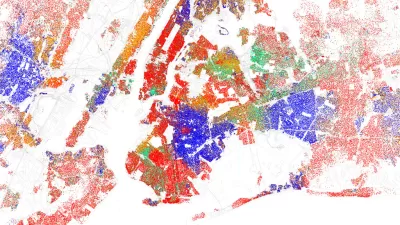Commentators relentlessly debate whether Donald Trump's support hinges on economics or race. Alexis C. Madrigal discusses how the two are joined at the hip, especially in real estate.

Making no attempt to hide his dislike for the candidate, Alexis C. Madrigal points out the folly of separating race and economics as factors in Donald Trump's rise. Looking at the history of segregated American real estate, Madrigal asserts that "for white people in America, 'economic anxiety' has always had a racial component.
"As early 20th century American real estate appraisers 'professionalized' their methods, they built a discriminatory system that literally ranked homes in white northern European neighborhoods as more valuable than homes in neighborhoods where black people (or Mexicans) lived." This provided the germ for "white flight" and troubled "inner cities" in the late 20th century.
Frederick Babcock's 1932 book The Valuation of Real Estate makes a prescient and racist case. As cities develop, "the central districts of a city were built first and were highly valuable, but then prices would fall as the upper classes moved to new housing further and further from the downtown core. At the same time, the closer-in neighborhoods would be successively 'infiltrated' by lower and lower classes."
The way to deal with this, Babcock argued, was to accept it and segregate the classes, by which he also meant races. This theoretical framework informed business and policy choices of later decades, essentially writing itself onto America's urban fabric.
Madrigal denounces how easy it is for otherwise "kindly" white people to accept a system that assigns lower value to non-white households. "So if a black family bought a house on a white family's block, they were effectively costing the white family money."
FULL STORY: Donald Trump and the truth about race and real estate in America

Alabama: Trump Terminates Settlements for Black Communities Harmed By Raw Sewage
Trump deemed the landmark civil rights agreement “illegal DEI and environmental justice policy.”

Study: Maui’s Plan to Convert Vacation Rentals to Long-Term Housing Could Cause Nearly $1 Billion Economic Loss
The plan would reduce visitor accommodation by 25% resulting in 1,900 jobs lost.

Planetizen Federal Action Tracker
A weekly monitor of how Trump’s orders and actions are impacting planners and planning in America.

Wind Energy on the Rise Despite Federal Policy Reversal
The Trump administration is revoking federal support for renewable energy, but demand for new projects continues unabated.

Passengers Flock to Caltrain After Electrification
The new electric trains are running faster and more reliably, leading to strong ridership growth on the Bay Area rail system.

Texas Churches Rally Behind ‘Yes in God’s Back Yard’ Legislation
Religious leaders want the state to reduce zoning regulations to streamline leasing church-owned land to housing developers.
Urban Design for Planners 1: Software Tools
This six-course series explores essential urban design concepts using open source software and equips planners with the tools they need to participate fully in the urban design process.
Planning for Universal Design
Learn the tools for implementing Universal Design in planning regulations.
Caltrans
Smith Gee Studio
Institute for Housing and Urban Development Studies (IHS)
City of Grandview
Harvard GSD Executive Education
Toledo-Lucas County Plan Commissions
Salt Lake City
NYU Wagner Graduate School of Public Service





























